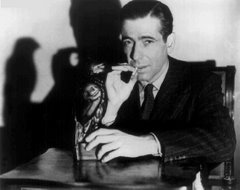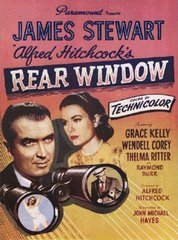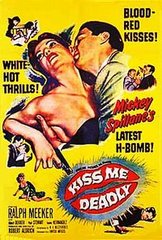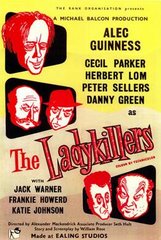"Of course it is happening inside your head, Harry, but why on earth should that mean that it is not real?"
Harry Potter and the Deathly Hallows
Thursday, July 26, 2007
Tuesday, July 17, 2007
Forgive me while I disapparate
But there are already Harry Potter book 7 spoilers lurking out there on the 'net and I don't want to be spoiled. I was spoiled for both books 5 and 6, and though it wasn't the end of the world or the defeat of my enjoyment of those books, I still don't want to be spoiled for book 7. I will not be blogging again until after I've read Harry Potter and the Deathly Hallows. I will not even be going on the internet again (except to check email) until after I've read the book. Heck, at this point, I probably won't be watching TV, listening to the radio, reading the newspaper, or leaving my house for the next five days. I'll be in my cone of silence until after the 21st of July. Goodbye till then!
Monday, July 16, 2007
These Dreams Are Dark
But in a good way.
More Harry stuff, this time an awesome bit of criticism from Matt Zoller Seitz at House:
The film's alternately doubting and exultant mood -- encapsulated by Radcliffe's nuanced performance -- at times reminded me of George Harrison's great solo debut, All Things Must Pass, arguably flower-power-rock's most moving contemplation of love, cruelty, spiritual yearning and the quest for self-knowledge. One of its finest songs, "Beware of Darkness," could double as the viewer's admonition to Harry:
... Another, more moving example occurs in a scene in the forest outside Hogwarts where Harry talks to Luna Lovegood (why the James Bond films didn't already use this name is a mystery) while feeding thestrals, spooky creatures that look like skinless winged horses. Luna explains to Harry that thestrals "can only be seen by people who've seen death." As she tells Harry of her mother's demise in a spell-casting accident, she feeds a baby thestral, first by tossing it an apple (which it ignores), then a slab of red meat (which it devours). When the foal's snout dips toward the meat, Yates cuts to a scene in Hogwarts' mess hall, starting with a closeup of Ron Weasley tearing into a sausage. This, too, initially reads as a mere sight gag, but it plugs into the story's core as surely as the paper airplane business. Harry, Luna, Ron and the series' other significant young characters are baby thestrals -- unsettling but deep-down-beautiful creatures whose specialness is associated with trauma.
snip
...and most delightful of all, Alan Rickman as Snape. Rickman's line readings, like Ian McDiarmid's in the Star Wars films, have a self-awareness which suggests the character realized long ago that he was a character in a drama and can't believe no one else has figured it out. (He's the Thomas Crown of acting: there's no scene he can't steal.) The film's admixture of unease and joy holds together, and it's consistent with Sirius Black's assurance to Harry that darkness and light coexist in every human soul, and that "what matters is what we choose to act on. That's who we really are."
Read it all, including the comments.
More Harry stuff, this time an awesome bit of criticism from Matt Zoller Seitz at House:
The film's alternately doubting and exultant mood -- encapsulated by Radcliffe's nuanced performance -- at times reminded me of George Harrison's great solo debut, All Things Must Pass, arguably flower-power-rock's most moving contemplation of love, cruelty, spiritual yearning and the quest for self-knowledge. One of its finest songs, "Beware of Darkness," could double as the viewer's admonition to Harry:
Watch out now, take caresnip
Beware of the thoughts that linger
Winding up inside your head
The hopelessness around you
In the dead of night
Beware of sadness
It can hit you
It can hurt you
Make you sore and what is more
That is not what you are here for.
... Another, more moving example occurs in a scene in the forest outside Hogwarts where Harry talks to Luna Lovegood (why the James Bond films didn't already use this name is a mystery) while feeding thestrals, spooky creatures that look like skinless winged horses. Luna explains to Harry that thestrals "can only be seen by people who've seen death." As she tells Harry of her mother's demise in a spell-casting accident, she feeds a baby thestral, first by tossing it an apple (which it ignores), then a slab of red meat (which it devours). When the foal's snout dips toward the meat, Yates cuts to a scene in Hogwarts' mess hall, starting with a closeup of Ron Weasley tearing into a sausage. This, too, initially reads as a mere sight gag, but it plugs into the story's core as surely as the paper airplane business. Harry, Luna, Ron and the series' other significant young characters are baby thestrals -- unsettling but deep-down-beautiful creatures whose specialness is associated with trauma.
snip
...and most delightful of all, Alan Rickman as Snape. Rickman's line readings, like Ian McDiarmid's in the Star Wars films, have a self-awareness which suggests the character realized long ago that he was a character in a drama and can't believe no one else has figured it out. (He's the Thomas Crown of acting: there's no scene he can't steal.) The film's admixture of unease and joy holds together, and it's consistent with Sirius Black's assurance to Harry that darkness and light coexist in every human soul, and that "what matters is what we choose to act on. That's who we really are."
Read it all, including the comments.
Saturday, July 14, 2007
The Patented Rickmanian Pause
If you want to find out what that is, and what my thoughts on Harry Potter and the Order of the Phoenix (David Yates, 2007) are, just read Cacciaguida. He and I are pretty much on the same wave length (scroll down to find it).
Labels:
blog rolling,
harry potter,
reviews and criticism
Sunday, July 08, 2007
Kids love crap

First, a rather lengthy quote, though one that I hope is as intriguing to the reader as it is to me (from C.S. Lewis's essay "Different Tastes in Literature," reprinted in On Stories and Other Essays On Literature):
I was suggesting last week that bad art is never really enjoyed in the same sense in which good art is enjoyed. It is only 'liked'; it never startles, prostrates, and takes captive. Now if I say that, I come up against a difficulty. It has never been better put than by that fine and neglected artist, Mr. Forrest Reid. In the little autobiography called Apostate he describes his delight, as a boy, in Miss Marie Corelli's Ardath. Even at that age the last part seemed to him 'so bad that it weakened the impression of what had gone before.' But that earlier impression remained. Perhaps wisely Mr. Reid has not risked an adult re-reading. He has feared that 'its gorgeousness would all too likely strike me as vulgarity, its passionate adventure as melodrama, its poetry as a crude straining after effect.' But none the less, adds Mr. Reid (who is as little likely as any man alive to be deceived in such a matter), there is no use in 'pretending that the old pleasure was not an aesthetic pleasure at all. It was. That is the whole point,' and he contributes the important suggestion: 'What I got then probably was the Ardath of Miss Corelli's imagination; what I should get now would be the very much less splendid Ardath of her actual achievement.'
This diagnosis may not be correct. Mr. Reid may have got the Ardath of the author's imagination, or he may have got the Ardath of his own; that is, he may really have been enjoying an embryonic composition of his own stimulated by mere hints in the book. But it is not necessary to decide between these two possibilities. The point is that, on either view, he was enjoying the book not for what it really was but for what it was not. And this sort of thing very often happens when the reader is imaginatively superior to the author, and is also young and uncritical. Thus for a boy in the first bloom of his imagination the crudest picture of a galleon under sail may do all that is necessary. Indeed he hardly sees the picture at all. At the first hint he is a thousand miles away, the brine is on his lips, her head rising and falling, and gulls have come to show that undiscovered country is near.
So far in my childhood movie series I've been pleasantly surprised by half-remembered movies like Fantasia, Pinocchio, and Dumbo; or I've been haunted and re-enchanted by perennial favorites like The Wizard of Oz; or I've been delighted to discover that my childhood tastes were actually quite good, with the rediscovery of the low-key and charming The Sword in the Stone. But now I've hit that disappointment which Forrest Reid was so fortunate to avoid by not re-reading his childhood favorite: The New Adventures of Pippi-Longstocking -- a movie that I loved as a child and wished were real (if only so Pippi and I could scrub clean our treehouse with broom-skates) -- is a bad movie. It is crap. It's tedious, episodic (in the worst way), badly acted, badly scripted, insipidly directed, and blemished by hideously 80s musical numbers (though I have to say, that title song is still as catchy as ever... Pippi Longstocking is coming into your world! That freckle-faced red-head girl you ought a know!). Tami Erin, as Pippi, is almost completely without charm, and her character, instead of being whimsical and carefree, is downright snotty and spoiled. I'm sure as a child I was on the side of Pippi. Today, I'm decidedly on the side of Miss Banister. Pippi is a brat.
It's not a mystery why I liked the movie so much as a kid: there are elements of a good movie here, but as is so often the case with bad movies, no one involved in the filmmaking process knew what to do with the real elements of entertainment that peeked through the dreck. As Lewis and Reid in the quote above point out, I was seeing the movie of my imagination, not the movie that was actually up on the screen. I was seeing broom-skates; flying on motorcycles and in "gyro-planes" with broken propellers; walking on walls and ceilings; living alone and eating pancakes in the middle of the night; having a talking horse and a monkey for companions; not having to go to school; ice cream fights and parades down main street; sticking your entire face into a cake for no reason; saving children from burning buildings by walking across a tightrope (Also: Did this movie contribute to my fear of fire? I would say yes, since that scene with the man throwing his cigarette into the pile of old mattresses and junk is less of a movie scene and more of a recurring nightmare that I've had for years -- Did it really all start with Pippi Longstocking?! The power of cinema, my friends...); being a pirate and having a cannibal king for a father. All these things and more, in my own imagination, were fashioned into a movie that was as carefree and adventurous as I wished my own life to be at seven years old. Through the cold, hard eyes of adulthood, I can now see that those things (the magic and wonderment) weren't really in the movie itself, at least not fully, or in any successful way was a work of art. They were only hinted at by the movie, hints and glimpses and unsuccessful attempts at whimsy that only became memorable because my own imagination absorbed them and made them into something with the power of a real work of art.
That cleaning scene where the kids skate around on brooms fashioned like roller skates is a perfect example. When I was a kid, that scene was the inspiration for many a dream of having a huge treehouse, a club house for my friend Andy and me, and we'd clean it by making broom-skates just like Pippi had used. It was my dream, for quite a few years after seeing the movie, to be crazy and wild like Pippi, to live in our club house and skate around with brooms on our feet. That it never came true only increased in my mind the fantasy and enchantment of that movie scene. And then I watched it the other day, and saw indeed those elements that had enthralled me as a child. But I also saw, couldn't help but see, how in the hands of a better director, a better script, and better actors, that scene could have truly been the scene of my imagination, instead of the weak, competent-but-completely-inartistic typical '80s kids movie crap-fest. Nearly every scene worth remembering was like that: a good idea ruined by poor filmmaking.
This whole experience seems to me to prove (in the way anecdotal evidence so definitively proves our pet theories) that kids, because they lack the critical eye, can very often fall in love with crap. They can dream and fantasize about and fashion great art from the most insipid hack work because they let their own imaginations fill in the bad spots. How many children a few years younger than I look back with longing on junk like Power Rangers and Pokemon, and how many of my own generation still cling to memories of things like, yes, Transformers. And that's just it: This junk is remembered not as it is, but as we wished it to be. The stories a child creates in his head of giant robots, of red-headed freckle-faced girls, of ninjas, are more thrilling than the swill that swill-makers peddle out every day for children to consume, but children consume it because children have the capacity to see beyond it to the stories of their imaginations, the stories that junk art is only able to hint at, but which provide the child's imagination with a thousand adventures and thrills.
I've decided to dump a few titles from my list of childhood movies I was going to rediscover, because I don't want to have my pleasant memories of these films dimmed by the reality that comes with viewing them with a more critical, adult eye. For some reason, call me crazy, I have a sinking feeling that if I watched it today, I wouldn't like Howard the Duck nearly as much as I did as a kid. Maybe I'll just let the memory of the movie endure, instead of crushing it with the weight of reality. Alas, for Pippi -- her movie, and my memory of it, were not so fortunate.
Subscribe to:
Comments (Atom)


















